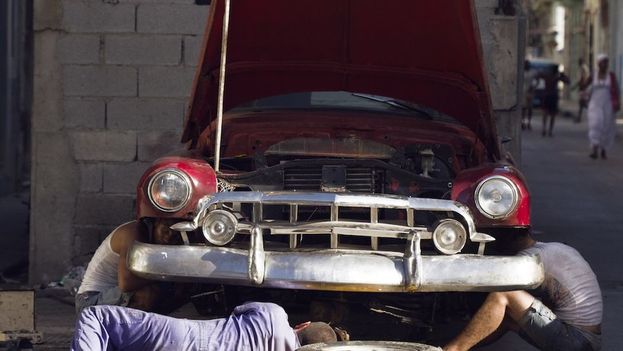
![]() 14ymedio, Marcello Hernandez, 10 September 2016 – The noise drowns out all talking. There is hammering, the sound of metal being cut, and a polisher that buzzes relentlessly. In the bodyshop belonging to Manolo – called El Gordo, the Fat Guy – located in Santiago de las Vegas, Friday looks like any other day: it is full of cars needing a new fender, trunk or door. The recent authorization for the sale of industrial gases on a wholesale basis to the self-employed barely alters the routine at this hectic place.
14ymedio, Marcello Hernandez, 10 September 2016 – The noise drowns out all talking. There is hammering, the sound of metal being cut, and a polisher that buzzes relentlessly. In the bodyshop belonging to Manolo – called El Gordo, the Fat Guy – located in Santiago de las Vegas, Friday looks like any other day: it is full of cars needing a new fender, trunk or door. The recent authorization for the sale of industrial gases on a wholesale basis to the self-employed barely alters the routine at this hectic place.
Manolo has specialized in making parts for ’55, ’56 and ’57 Chevrolets, but his workshop also attends to the “chariots of Real Socialism” as he ironically calls the Soviet-made Ladas and Moskvitches. Creating rear columns is his favorite work; three decades ago he graduated from a university specialty that he has never engaged in.
This metal artist assures 14ymedio the new commercial flexibility, focused on the activities of sheet metal work, blacksmithing and oxy-welding, “will change the current situation very little.”
“They have taken a long time to take this step, but at least it’s something,” he says.
The wholesale authorization began with the enactment of Resolution 335, of August 31, 2016, published in the Official Gazette No. 25. The move comes three years after chapistero – bodyshop worker – was approved as one of the forms of self-employment Cubans can engage in and for which they must obtain a license. During this time these “professionals of the torch” have had to continue paying retail prices or make their purchases on the informal market.
Since 2013, the retail sale of oxygen and acetylene has been approved in the TRD chains (TRD literally stands for “Hard Currency Collection Stores”), and in CIMEX stores (also State-owned), along with empty cylinders necessary to store these gases. Now the authorization also includes wholesale trade in nitrogen and argon.
However, Manolo says that “the cylinders are supposedly for sale in the hard currency stores,” but he has never been able to buy them there, because the supply is unstable and “they are always out of them.”
“It was much easier and cheaper to get it the under the table,” he explained to this newspaper. A practice common among all the bodyshops that abound across the country.
Three years ago the authorities explained that the decision to grant licenses for these and other trades was taken because they had created the conditions in the country to market “raw materials, equipment and other supplies in the store network and at specific points” but the delay in providing these resources has been a concern among those intended to benefit from the measure.
A few blocks from Manolo’s workshop is the competition. Augustine has a more modest shop with no signage, but as of a couple of years ago he has begun to carve out a loyal clientele. He cannot benefit from the new option buying his gas wholesale because he lives in Havana without the necessary permit to reside in the city, after migrating from his native Camagüey.
“Nobody knows what it costs to jump from rental to rental and the cost of renting a half-hidden place in the outback to work in the only thing I know how to do, bodywork on cars,” he explains.
Without a legal residence in the Cuban capital he can not even apply for a license to do bodywork. “Without that they’re not going to sell me so much as a match to light the wick, so I’ll have to keep paying 400 pesos for a couple of cylinders.”
He can’t even take advantage of the service that leases the empty cylinders on a monthly fee basis, nor can he contract with the state company to transport the cylinders to his bodyshop, two of the measures announced Friday, available to licensed individuals.
Augustine is concerned that the official information published by the newspaper Granma did not specify what the new “wholesale prices” will be in the “territorial units of the Industrial Gases Company.” Nor did it detail if the metal sheets of the different sizes needed to create body parts will also be offered.
“The biggest problem we have now is the tools,” complains the bodyshop worker. “They will sell the gas, but where are the shears, the presses, the good cutters, the bending and stamping machines that are lacking in any body shop?” he asks.
In the middle of Augustine’s workshop is a Chevrolet dismantled into pieces that he is beginning to restore to the gloss of yesteryear. “This is done with patience, this is a job that you must know how to wait for,” he says.
